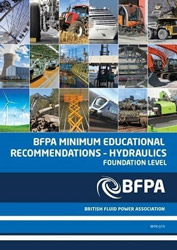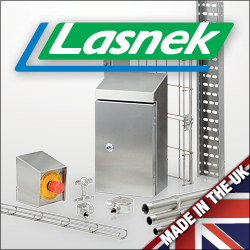
Posted to News on 21st Sep 2018, 11:41
New minimum requirements for fluid power training
Modern industry is far safer than it has ever been, with advances in smart automation and legislation playing key roles in providing both the carrot and stick for the uptake of contemporary safety measures. This industry-wide change in attitude has created an incredibly positive landscape, with the adoption of safe, secure technology now being the norm.

Maintenance has a huge role to play in the safe operation of heavy equipment and machinery. Badly maintained systems can completely negate the positive impact of even the most advanced safety measures. The same is true for productivity and throughput; badly maintained or incorrectly installed systems can bring about elevated levels of downtime, the metric by which just about every plant operations manager on the planet is measured.
As a result, a wider spotlight is being placed on training in order to ensure that tasks undertaken by all operators and staff, from the engineer down to the technician on the shop floor - especially where maintenance is concerned - do not have a detrimental effect on the overall safety rating of a device, vehicle or plant.
New publication
Leading the way in the fluid power industry is the British Fluid Power Association (BFPA). By leveraging the resources of its Education and Training (E&T) Committee, it has developed a publication entitled BFPA Minimum Educational Recommendations - Hydraulics as part of a three-part suite of Educational Recommendations that also cover pneumatics and electronic control of fluid power. This new document presents the consolidated view of leading representatives and experts in fluid power - including academia, representatives from other BFPA member organisations, OEMs and the wider UK engineering industry - managed by a specially convened BFPA Education and Training (E&T) Task-force.
Ian McKenna, Plant Technical Support Supervisor at Bachy Soletanche in Lancashire, explains the need for adequate training: "We deal with big hydraulic drilling rigs - often with pressures up to 350 bar - and because people do not see what is going on inside, they often do not appreciate the dangers. This is especially true of new, young engineers who already have a digitally-based background, but very little appreciation of heavy 'analogue' equipment.
"A prescribed minimum level training is a big step forward, as it will show from an early stage that you are working with equipment and media that could kill you. Technicians, operators, designers and maintenance engineers all need to understand how severe it could be - even by simply undoing a fitting. They all need minimum level of training in fluid power from the word go.
"We find that new staff who have been to college as part of an apprenticeship have not gone into enough depth in hydraulics and, since the downturn in manufacturing a few years back, there are no longer the staff to perform shadowing and traditional on-the-job training. As a result, we have created our own internal training course, which covers 90 per cent of the BFPA's minimum recommendations, and is in the process of being tailored to match them 100 per cent.
"We have a policy here that is remarkably straightforward: if you do not have experience, you do not do it, then you cannot do it wrong. This makes it easier to identify issues and, if there is a problem or incident, the paper trail goes down to personnel training levels. This gives us the opportunity to upskill and create the more rounded multi-skilled engineers that modern industry is demanding."
Skills shortage
Graham Spencer, Senior Instructor at Festo, agrees with McKenna on the recent plight of UK engineering and the necessity for a consensus-based training regimen: "The emphasis on engineering in the UK has diminished recently. A huge blip some years ago resulted in the throughput of people who would pick this up in their everyday job simply stopping. Luckily, this 'error of ways' has now been recognised, but we have still experienced a huge loss of skills. There just are not the people coming through that know this stuff. People have not been learning from others and there are fewer apprentices.
"Luckily, this blip has galvanised industry, and the primary parties are all feeding their thoughts and concerns back into BFPA, the result being publications such as the 'BFPA Minimum Educational Recommendations - Hydraulics.'"
Martin Kingsbury, Membership and Training Director at the BFPA, explains the rationale behind the development of the document and the way forwards: "All of our members agreed that this document, the direction industry should be headed and the training-recognition systems we are putting into place have been a long time coming. With fluid power technology being deployed in such a wide variety of industries, it is essential that we have some form of minimum requirement that addresses the needs of a contemporary workforce. It took a while to pull together, with a lot of effort and time being devoted to what everyone agreed would be an acceptable minimum level.
"We have now set up training programmes to help everyone - from the operator or technician on the shop floor up to the engineers - attain these levels. We are by no means the sole provider. Indeed, we are encouraging our members to create their own training programmes, taking guidance from the published levels and our written course material. Similar to the CORGI (gas safe) rating used in the gas industry, we want member companies and wider industry to adopt the ethos 'if you are to work on my equipment, you need to have this prescribed minimum level of training.' This has to be industry-driven, and by a willing industry, but it should have enough traction and buy-in that it will soon become the norm."
Evidence of training
How do people prove their training levels? Kingsbury explains: "We have now introduced the BFPA training passport card, which includes a photograph and lists the cardholder's verified training course details on the back. The idea is to highlight the individual's commitment to safe working practices and high standards in the fluid power industry. The new training passport cards can be issued retrospectively to anyone who has completed a BFPA course within the past two years, or a CETOP course, and BFPA will hold the training history of those individuals who have completed courses directly with the BFPA or one of BFPA's training providers.
"We want to establish this as a must-have minimum training for anyone, at any level in industry, working with hydraulics, and aim to encourage both individuals and their employers to get on board. The BFPA has also launched another set of recommendations to cover pneumatics and will soon complete another for electronics, which will complete the trilogy."
Safety is such an important facet of just about any industrial or commercial operation. New, holistic approaches to safety, including training, are showing positive effects, not just in terms of employee worth and retention, but also to the bottom line.
The BFPA, as an umbrella organisation, takes its role very seriously and is committed to improving safety in fluid power. As this programme rolls out and more accredited training opportunities become available, the UK's workforce will have the chance to harness this greater knowledge and evolve into the multi-skilled personnel that modern companies and industries demand.
For more information about the BFPA's new hydraulic or pneumatic minimum educational recommendations, please call BFPA on 01608 647900 or email [email protected] (please mention MachineBuilding.bet).
To download a free copy of the new hydraulic minimum educational recommendations, visit the BFPA's publications pages.
British Fluid Power Association (BFPA)
Cheriton House
Cromwell Park
OX7 5SR
UNITED KINGDOM
+44 (0)1608 647900


















